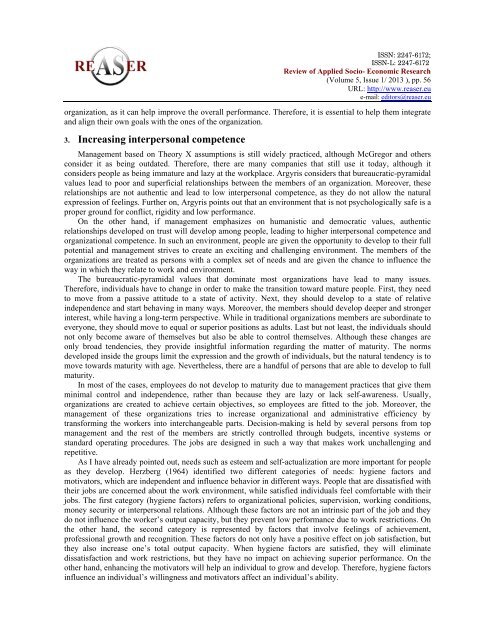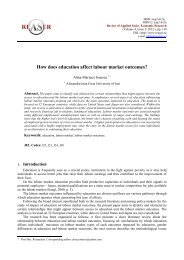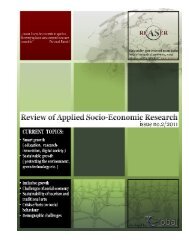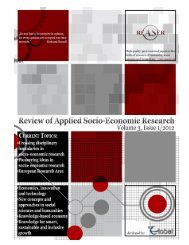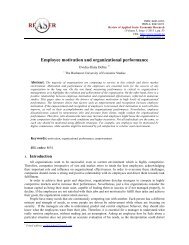new characteristics of inequalities in the information society and ...
new characteristics of inequalities in the information society and ...
new characteristics of inequalities in the information society and ...
Create successful ePaper yourself
Turn your PDF publications into a flip-book with our unique Google optimized e-Paper software.
ISSN: 2247-6172;<br />
ISSN-L: 2247-6172<br />
Review <strong>of</strong> Applied Socio- Economic Research<br />
(Volume 5, Issue 1/ 2013 ), pp. 56<br />
URL: http://www.reaser.eu<br />
e-mail: editors@reaser.eu<br />
organization, as it can help improve <strong>the</strong> overall performance. Therefore, it is essential to help <strong>the</strong>m <strong>in</strong>tegrate<br />
<strong>and</strong> align <strong>the</strong>ir own goals with <strong>the</strong> ones <strong>of</strong> <strong>the</strong> organization.<br />
3. Increas<strong>in</strong>g <strong>in</strong>terpersonal competence<br />
Management based on Theory X assumptions is still widely practiced, although McGregor <strong>and</strong> o<strong>the</strong>rs<br />
consider it as be<strong>in</strong>g outdated. Therefore, <strong>the</strong>re are many companies that still use it today, although it<br />
considers people as be<strong>in</strong>g immature <strong>and</strong> lazy at <strong>the</strong> workplace. Argyris considers that bureaucratic-pyramidal<br />
values lead to poor <strong>and</strong> superficial relationships between <strong>the</strong> members <strong>of</strong> an organization. Moreover, <strong>the</strong>se<br />
relationships are not au<strong>the</strong>ntic <strong>and</strong> lead to low <strong>in</strong>terpersonal competence, as <strong>the</strong>y do not allow <strong>the</strong> natural<br />
expression <strong>of</strong> feel<strong>in</strong>gs. Fur<strong>the</strong>r on, Argyris po<strong>in</strong>ts out that an environment that is not psychologically safe is a<br />
proper ground for conflict, rigidity <strong>and</strong> low performance.<br />
On <strong>the</strong> o<strong>the</strong>r h<strong>and</strong>, if management emphasizes on humanistic <strong>and</strong> democratic values, au<strong>the</strong>ntic<br />
relationships developed on trust will develop among people, lead<strong>in</strong>g to higher <strong>in</strong>terpersonal competence <strong>and</strong><br />
organizational competence. In such an environment, people are given <strong>the</strong> opportunity to develop to <strong>the</strong>ir full<br />
potential <strong>and</strong> management strives to create an excit<strong>in</strong>g <strong>and</strong> challeng<strong>in</strong>g environment. The members <strong>of</strong> <strong>the</strong><br />
organizations are treated as persons with a complex set <strong>of</strong> needs <strong>and</strong> are given <strong>the</strong> chance to <strong>in</strong>fluence <strong>the</strong><br />
way <strong>in</strong> which <strong>the</strong>y relate to work <strong>and</strong> environment.<br />
The bureaucratic-pyramidal values that dom<strong>in</strong>ate most organizations have lead to many issues.<br />
Therefore, <strong>in</strong>dividuals have to change <strong>in</strong> order to make <strong>the</strong> transition toward mature people. First, <strong>the</strong>y need<br />
to move from a passive attitude to a state <strong>of</strong> activity. Next, <strong>the</strong>y should develop to a state <strong>of</strong> relative<br />
<strong>in</strong>dependence <strong>and</strong> start behav<strong>in</strong>g <strong>in</strong> many ways. Moreover, <strong>the</strong> members should develop deeper <strong>and</strong> stronger<br />
<strong>in</strong>terest, while hav<strong>in</strong>g a long-term perspective. While <strong>in</strong> traditional organizations members are subord<strong>in</strong>ate to<br />
everyone, <strong>the</strong>y should move to equal or superior positions as adults. Last but not least, <strong>the</strong> <strong>in</strong>dividuals should<br />
not only become aware <strong>of</strong> <strong>the</strong>mselves but also be able to control <strong>the</strong>mselves. Although <strong>the</strong>se changes are<br />
only broad tendencies, <strong>the</strong>y provide <strong>in</strong>sightful <strong>in</strong>formation regard<strong>in</strong>g <strong>the</strong> matter <strong>of</strong> maturity. The norms<br />
developed <strong>in</strong>side <strong>the</strong> groups limit <strong>the</strong> expression <strong>and</strong> <strong>the</strong> growth <strong>of</strong> <strong>in</strong>dividuals, but <strong>the</strong> natural tendency is to<br />
move towards maturity with age. Never<strong>the</strong>less, <strong>the</strong>re are a h<strong>and</strong>ful <strong>of</strong> persons that are able to develop to full<br />
maturity.<br />
In most <strong>of</strong> <strong>the</strong> cases, employees do not develop to maturity due to management practices that give <strong>the</strong>m<br />
m<strong>in</strong>imal control <strong>and</strong> <strong>in</strong>dependence, ra<strong>the</strong>r than because <strong>the</strong>y are lazy or lack self-awareness. Usually,<br />
organizations are created to achieve certa<strong>in</strong> objectives, so employees are fitted to <strong>the</strong> job. Moreover, <strong>the</strong><br />
management <strong>of</strong> <strong>the</strong>se organizations tries to <strong>in</strong>crease organizational <strong>and</strong> adm<strong>in</strong>istrative efficiency by<br />
transform<strong>in</strong>g <strong>the</strong> workers <strong>in</strong>to <strong>in</strong>terchangeable parts. Decision-mak<strong>in</strong>g is held by several persons from top<br />
management <strong>and</strong> <strong>the</strong> rest <strong>of</strong> <strong>the</strong> members are strictly controlled through budgets, <strong>in</strong>centive systems or<br />
st<strong>and</strong>ard operat<strong>in</strong>g procedures. The jobs are designed <strong>in</strong> such a way that makes work unchalleng<strong>in</strong>g <strong>and</strong><br />
repetitive.<br />
As I have already po<strong>in</strong>ted out, needs such as esteem <strong>and</strong> self-actualization are more important for people<br />
as <strong>the</strong>y develop. Herzberg (1964) identified two different categories <strong>of</strong> needs: hygiene factors <strong>and</strong><br />
motivators, which are <strong>in</strong>dependent <strong>and</strong> <strong>in</strong>fluence behavior <strong>in</strong> different ways. People that are dissatisfied with<br />
<strong>the</strong>ir jobs are concerned about <strong>the</strong> work environment, while satisfied <strong>in</strong>dividuals feel comfortable with <strong>the</strong>ir<br />
jobs. The first category (hygiene factors) refers to organizational policies, supervision, work<strong>in</strong>g conditions,<br />
money security or <strong>in</strong>terpersonal relations. Although <strong>the</strong>se factors are not an <strong>in</strong>tr<strong>in</strong>sic part <strong>of</strong> <strong>the</strong> job <strong>and</strong> <strong>the</strong>y<br />
do not <strong>in</strong>fluence <strong>the</strong> worker’s output capacity, but <strong>the</strong>y prevent low performance due to work restrictions. On<br />
<strong>the</strong> o<strong>the</strong>r h<strong>and</strong>, <strong>the</strong> second category is represented by factors that <strong>in</strong>volve feel<strong>in</strong>gs <strong>of</strong> achievement,<br />
pr<strong>of</strong>essional growth <strong>and</strong> recognition. These factors do not only have a positive effect on job satisfaction, but<br />
<strong>the</strong>y also <strong>in</strong>crease one’s total output capacity. When hygiene factors are satisfied, <strong>the</strong>y will elim<strong>in</strong>ate<br />
dissatisfaction <strong>and</strong> work restrictions, but <strong>the</strong>y have no impact on achiev<strong>in</strong>g superior performance. On <strong>the</strong><br />
o<strong>the</strong>r h<strong>and</strong>, enhanc<strong>in</strong>g <strong>the</strong> motivators will help an <strong>in</strong>dividual to grow <strong>and</strong> develop. Therefore, hygiene factors<br />
<strong>in</strong>fluence an <strong>in</strong>dividual’s will<strong>in</strong>gness <strong>and</strong> motivators affect an <strong>in</strong>dividual’s ability.


